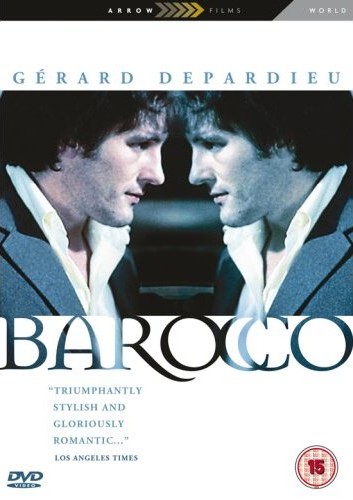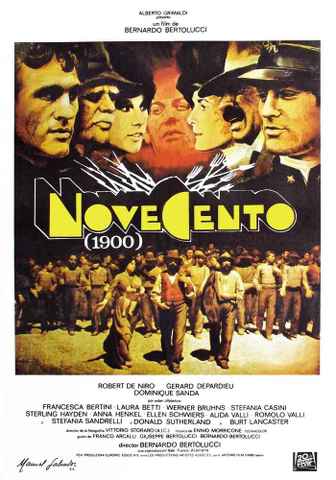
![]()
By 1993, cinema had become a language unto itself; it was a language that was made up of not only words, but also sounds and images. As cinema history continues, the language has expanded time after time due to the talents and experiments of master filmmakers such as Jean-Luc Godard. All throughout his vast, decade spanning career, Godard has made film upon film, and with each decade of Godard that passes by, the more radical his style becomes. If ever there was a filmmaker that I could say took the cinematic language to Joycean heights, that filmmaker is, without question, Godard. With “Oh, Woe Is Me”, Godard practically makes the cinematic equivalent of James Joyce’s “Finnegans Wake” by crafting a masterpiece that works as a perplexing jigsaw puzzle, one injected with all kinds of clever jokes as well as sections of poetic beauty. (From IMDb)Read More »
Gérard Depardieu
-
Jean-Luc Godard – Hélas pour moi AKA Oh, Woe Is Me (1993) (HD)
1991-2000ArthouseFranceJean-Luc GodardPhilosophy -
Maurice Pialat – Sous le soleil de Satan AKA Under the Sun of Satan (1987)
1981-1990DramaFranceMaurice PialatQuote:
Under the Sun of Satan opens to an inherently solemn ritual as a senior priest, Canon Menou-Segrais (Mauric Pialat) shaves a spot on the top of the head of a pensive young priest named Father Donissan (Gérard Depardieu) who, in turn, uses the occasion to express his feelings of profound estrangement and inutility from the practical concerns of their congregation. Acknowledging both his mediocre scholastic aptitude at the seminary that nearly prevented him from becoming ordained, and his indebtedness to Menou-Segrais for his admission into the parish ministry (despite the young priest’s perceivable disapproval of his superior’s spiritual resignation and complacency), Donissan nevertheless declares his intention to request the archbishop for a re-assignment, preferably to a Trappist monastery where he believes that his temperament and secular detachment would be more conducive to their contemplative, monastic life of humble (and seemingly unobtrusive) service.Read More » -
Marguerite Duras – Nathalie Granger [+Extras] (1972)
Drama1971-1980ArthouseFranceMarguerite DurasThe most insidious thing about the nouveau movie, which is a polite way of describing Marguerite Duras’s newest, most minimal film, “Nathalie Granger,” is that it traps you in its own time, unlike the nouveau roman, which can be skipped through or read at leisure in an afternoon or a year. You can’t skip through “Nathalie Granger.” To see it you are forced to watch it for as long as it lasts, while, in turn, it watches its characters, rather as if the camera were a Siamese cat whose feelings had been hurt. Without betraying the slightest interest, the camera records the physical appearance of two expressionless women who look a lot like Jeanne Moreau and Lucia Bose. They share a house with their two children, one of whom, Nathalie, is apparently a problem. “She wants to kill everyone,” says one of the women, who seem to be interchangeable. “She wants to be an orphan, or a Portuguese maid.” Nathalie, however, remains docile—this being a minimal movie.Read More »
-
Claude Berri – Germinal (1993)
Drama1991-2000BelgiumClaude BerriSynopsis:
In mid-nineteenth-century northern France, a coal mining town’s workers are exploited by the mine’s owner. One day, they decide to go on strike, and the authorities repress them.Read More » -
François Ozon – Potiche (2010)
France2001-2010ComedyFrançois OzonSynopsis :
When her husband is taken hostage by his striking employees, a trophy wife (Deneuve) takes the reins of the family business and proves to be a remarkably effective leader. Business and personal complications arrive in the form of her ex-lover (Depardieu), a former union leader.Read More » -
Anne Fontaine – Nathalie… [+Extras] (2003)
2001-2010Anne FontaineDramaFranceQuote:
A rich woman hires an elite prostitute in order to verify her husband’s faithfulness. Before long the experiment gets out of control.Read More » -
André Téchiné – Barocco (1976)
1971-1980André TéchinéDramaFranceRomanceBAROCCO, from director André Téchiné is an entrancing and operatic take on a political thriller that invokes the plot twists and bizarre narrative elements of Alfred Hitchcock’s VERTIGO as it creates a world of crooked politicians, virtuous prostitutes, doppelgangers, and destiny.
On the eve of a local election in Amsterdam, Samson (Gérard Depardieu), a boxer, is paid to create a scandal by saying he had a homosexual affair with one of the candidates. Although Samson is reluctant to get involved, his girlfriend, Laure (Isabelle Adjani), persuades him to agree and use the money to escape the city. As Laure and Samson are attempting to leave the city, a gangster who looks exactly like Samson (played also by Depardieu) emerges from nowhere and murders him. An intricate chase ensues as the assassin tries to find Laure (and the money), the politicians and gangsters try to find the assassin, and Laure attempts to re-create her lost love in the form of the look-alike killer. The characters’ dancelike movement through the shadow world of Amsterdam and the evocative settings (a gleaming storefront brothel and a sinister underworld spa) provide austere backdrops to this metaphorical thriller. The dark side of politics and human nature are uncovered as Laure begins to love the assassin and the government attempts to control it all.Read More »
-
Bernardo Bertolucci – Novecento aka 1900 [Extras] (1976)
1971-1980Bernardo BertolucciDramaEpicItalySynopsis
Quote:
Bernardo Bertolucci’s vast historical melodrama used the massive popular, critical, and financial success of its predecessor, the scandalous LAST TANGO IN PARIS, to mount a production of epic scale. Cut down to four hours for its American release, the film utilizes an all-star Hollywood…
Bernardo Bertolucci’s vast historical melodrama used the massive popular, critical, and financial success of its predecessor, the scandalous LAST TANGO IN PARIS, to mount a production of epic scale. Cut down to four hours for its American release, the film utilizes an all-star Hollywood cast to tell its heavily Marxist tale of Italian peasants during the twentieth century. Two boys born on the same day are destined for divergent paths; Olmo (played by Gerard Depardeiu as an adult) is born to peasant parents and will become a passionate socialist, while Alfredo’s (Robert De Niro as an adult) bourgeois, landowning origins will lead him to ultimately embrace fascism. Driven by a sincere hope for and belief in political change, Bertolucci’s film is nonetheless made up of very humane individual stories; it concentrates on highly personal experiences of a politically-charged time, which color the little dramas of love, sex, family, and community. It is at once an epic poem and a political manifesto, and it is the product of a director who was unabashedly communist in his youth, contrasting markedly with later works like 2003’s THE DREAMERS.Read More »







